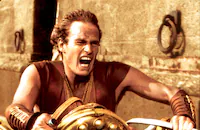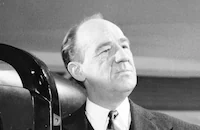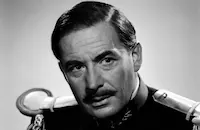1884. The Mahdi, a self-ordained leader of a new Jihad that he hopes will sweep the Mohammedan world (Laurence Olivier), threatens the Sudan and Egypt, vital centers of influence for the British Empire. Egypt has already lost an army trying to subdue him, and Prime Minister Gladstone (Ralph Richardson) has no intention of miring his government in another African fiasco. He sends General Charles 'Chinese' Gordon, hero of the opium wars (Charlton Heston). Gordon brought peace and an end to the slave trade in the Sudan a decade before, and perhaps can turn the tide now. Accompanied by Colonel J.D.H. Stewart (Richard Johnson), Gordon travels to Khartoum only to find that the Mahdi cannot be dissuaded. Morally bound not to quit the city, he forces Gladstone's hand, and an army is indeed sent up the Nile under the command of General Wolseley (Nigel Green). But its purpose is to assuage critics back in London, not save Gordon. The legendary General prepares to defend Khartoum against overwhelming odds.
Shot on location in Ultra Panavision (that's 65mm, slightly squeezed), Khartoum has a true epic feel and some wonderfully detailed battles. One conflict makes clever use of matted red skies to evoke a convincing pre-dawn look (see next image below). The geography of the Nile River and Khartoum's location at a fork between two major tributaries is very clearly spelled out. Robert Ardrey's Oscar-nominated script clarifies the politics of a highly contentious situation. Just five years before, an entire British government fell because of a defeat under the spears of an African Zulu army. Gladstone's intention is make the right 'gestures' to achieve his desired political ends -- without risk of another humiliating disaster.
Khartoum does its best to heighten the clash between two determined religious men, General Gordon and the implacable Mahdi. In reality the two never met face to face, but the script has them engaging in two meetings anyway. This may be bad history, but is a necessary contrivance to animate the story. Both men believe in divine intervention and the utter rightness of their cause. The Mahdi has delusions of grandeur, and Gordon's vanity is legendary. Both are ascetics to some degree, and both believe their ultimate reward will be found only in the next life.
Screenwriter Robert Ardrey was a social scientist known for scholarly nonfiction. He's also the screenwriter for the nearly perfect western The Wonderful Country, in which gunslinger Robert Mitchum finds himself in a political bind between Texas lawmen and Mexican warlords. The big message in this colonial-era story is that without clear policies, foreign affairs are doomed to end in messy and tragic wars without honor or purpose. It was too early for the judiciously left-leaning producer Julian Blaustein (Broken Arrow; The Day the Earth Stood Still) to be alluding to Vietnam, and the movie is better for not having to carry that baggage. The irony is that, even as Khartoum shows the cynical way Gladstone regards colonial issues, the movie still resolutely insists that Gordon is some kind of savior to the Sudanese. In one scene, his main black lieutenant confuses him with Jesus Christ. Crediting Gordon with humanitarian aims is difficult to justify. His previous experience was helping to subdue China for the opium trade, one of the most cynically wretched campaigns in colonial history.
If the film never transcends the 'favorite battles' genre, it's because we never learn much about the Sudanese people or why Gordon was so beloved. For that matter, we also aren't told exactly what made the Mahdi such a demon. Could he be justified in liberating his country from the influence of so many infidel Europeans and their passive Egyptian cronies? Or is he yet another accursed maniac bent on slaughtering multitudes in revenge against the West? Khartoum is critical of British policy, but it is still told from an exclusively British point of view.
Charlton Heston is so good at playing larger-than life military heroes that he overcomes the fact that he hasn't an English bone in his body. He also doesn't remotely resemble the reportedly short and stout Gordon. Few actors could face a mob of assassins with just a walking stick in his hand and not look foolish, but that's the exact kind of scene that comes naturally to Heston.
Laurence Olivier's part was carefully designed so that his entire performance could be filmed on a soundstage back in England. This works out all right, except that it adds to the static feel of much of the picture. Dyed dark brown, and affecting a manner of speech that's either inspired or the all-time bad 'Wog' imitation, Sir Larry has come up for some heavy criticism over the years. The Mahdi pronounces 'Khartoum' as if he were clearing his throat to spit, and when his mouth is at rest he often lets his tongue protrude, like a third lip. But the deviousness in The Mahdi's eyes, and the reptilian glee with which he informs Gordon that all hopes for reinforcement are doomed, are exceedingly well expressed. It's Acting with a capital A, and it provides the film with a credible, fascinating villain.
Ralph Richardson and Michael Hordern do their usual solid jobs as the standard equivocating politicians. Richard Johnson was Bulldog Drummond in a couple of spy pictures and was once considered to play James Bond. He's a suitably dashing but almost completely inexpressive leading man, perfectly suited to these kinds of stiff-soldier roles. This is one of his best pictures, as J.D.H. Stewart is a sympathetic good soldier doing his best for his country and his ego-driven commander. Surrounded here by knights and classier players, in the '70s Johnson turned to crude Euro-horror - zombie movies and Exorcist rip-offs. The English actor-chameleons Marne Maitland and Douglas Wilmer cover the leading Arab roles.
The prologue scenes of Egypt are attractively filmed, although the "Africa is mysterious" voiceover that goes with them doesn't prepare us for the cynical politics that follows. Perhaps taking a cue from the cost overruns of Sam Spiegel's Lawrence of Arabia, the mostly unadventurous director Basil Dearden puts economy first. As both Gordon and The Mahdi stayed in their headquarters during the major battles, the actors do a lot of their emoting on English sets and process stages. Heston definitely spent time on location for scenes showing Gordon traveling by boat and preparing the defenses of the city, but he's also matted into quite a few dialogue scenes, sometimes not very convincingly. Most of the scenes of massive armies clashing in the desert and at the gates of the city, no recognizable actors are on view - an editor could easily paste the same footage into another movie and few would be the wiser.
(spoiler) At the finale General Gordon goes to his fate like a noble martyr. We're simply told that his alter ego The Mahdi followed him in Death soon thereafter, as Gordon had predicted. Multitudes of Sudanese, Egyptians and Europeans are presumed to perish, along with all the good and dutiful soldiers we have met. Whether this worked out well for the conniving Gladstone and his political cronies is not divulged. We are instead given the movie's low point, a thudding final benediction: "A world with no room for the Gordons, will be reclaimed by the sands." Huh? It almost sounds like, 'A Day without a Wicket is a Day without Sunshine', from How to Succeed in Business Without Really Trying. This entertaining epic criticizes colonial politics, and then eulogizes them.
Khartoum was Charlton Heston's last major Road Show movie. Unlike El Cid, it has absolutely no romantic angle and is therefore limited in box office appeal to male fans of war and battle. For a Road Show it's rather short: only two hours and sixteen minutes with overture, intermission and curtain music. A typical Road Show was between 160 and 190 minutes, with an intermission at about the hundred-minute mark. It's a nice format that would be fun to see come back, as it was always exciting to have a mid-point chat about the show (and run to the restroom) before getting back to battles. With the modern cinema's lack of pageantry (no fancy curtain rituals) and desire to cram in as many shows as possible per day, the Road Show format is not likely to return. Audiences are now often asked to sit through 2.5 - 3 hour movies without a break.
The Twilight Time Blu-ray of Khartoum is a glorious thing. Beautifully remastered from 65mm elements, the HD transfer reflects the fine work of MGM's restoration people at Deluxe Digital. The movie has few opticals and it appears to have been perfectly stored and preserved. Frank Cordell's "King & Country" flavored compositions are auditable on a discrete Isolated Score Track, a Twilight Time specialty. An original trailer is also included.
The commentary by Nick Redman, Lem Dobbs and Julie Kirgo offers a useful comparison of the film to historical accounts of the Siege of Khartoum. A wealth of detail was left out, much of it presumably to make Chinese Gordon appear more heroic. For instance, the great emancipator of The Sudan reportedly reinstated the slave trade during the siege. In other respects the commentary seems ill judged. Khartoum is constantly being belittled in comparison to Cy Endfield's Zulu. A commentary shouldn't end up as critical target practice... Khartoum has nothing to be ashamed of.
Ms. Kirgo's liner notes are more balanced. She finds apt comparisons between Basil Dearden's epic and Franklin J. Schaffner's Patton. To this writer, the obvious forerunners of this 'Brits in Africa' saga are the several versions of The Four Feathers, a more rousing but considerably less enlightened adventure epic.
By Glenn Erickson































